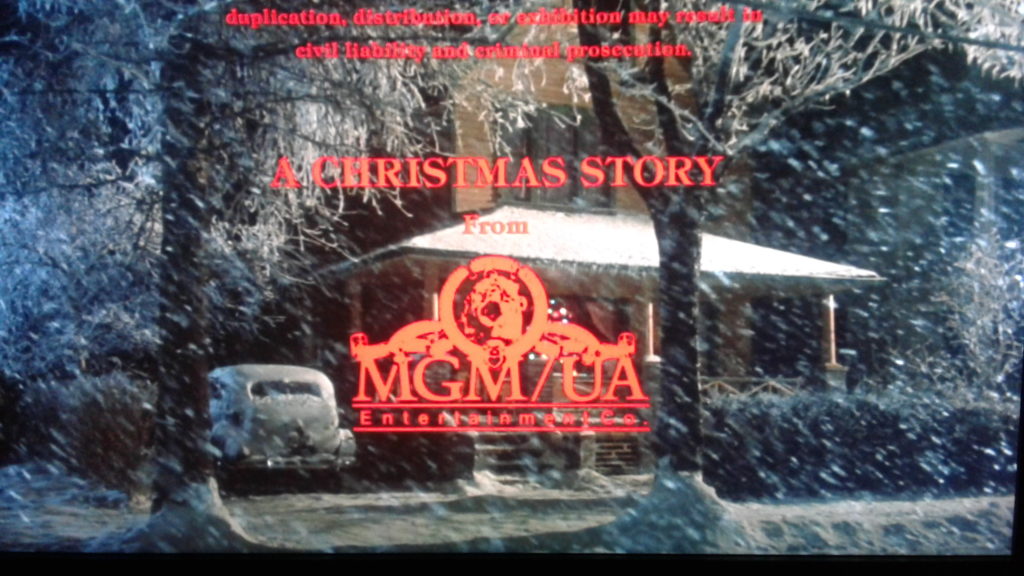Invaluable Wisdom From The Voice Behind A Holiday Classic
Oh, life is like that. Sometimes, at the height of our revelries, when our joy is at its zenith, when all is most right with the world, the most unthinkable disasters occur.
– A Christmas Story (1983, dir. Bob Clark)
“OK, folks, the granddady of ’em all, the big one, the queen mother of all Christmas movies – and a veritable cornucopia of yuletide hilarity to boot – yes, friends, it’s A Christmas Story.” That feverish invocation opened a capsule summary of my first-ever Christmas-themed movie list a few years back, and while a couple more Christmas-related topics have absorbed my movie-watching attention in the intervening years (here and here), none have directly addressed the pain of growing up around the holidays more vividly, or hilariously, as a kid’s movie-length stress over a much-desired Christmas present. Not so much a gift as an elusive symbol of the ever-unattainable, little Ralphie Parker’s quixotic quest for a Red Ryder BB gun with a compass in the stock (and this thing which tells time) immortally captures the exquisite agony of wanting what you can’t have; and then, worse, actually getting it.
A hard lesson, to be sure. But then, A Christmas Story is chock full of such barbed, hard-earned wisdom. Far from sugar-coating its seasonal truths, a franker consideration of this heartwarmingly nostalgic, Middle American Christmas reveals deliciously bittersweet depths to its chortling cheer. Springing forth, as further noted in my original capsule review, from the fecund imagination of screenwriter, film-length narrator, and cameo-appearing humorist Jean Parker Shepherd (1921 – 1999), these semi-autobiographical musings offer glittering pearls of wisdom from radioland’s most loquacious raconteur that will serve one well any time of the year.

Jean Shepherd: non-fathead
This year’s Christmas list, then, will hopefully serve as an introduction, overview, and in-depth exploration of the deep comic mind and rich philosophy behind the most re-run, re-watched, and now even re-staged Christmas movie of recent times. Following the movie sequentially, I shall be attempting to isolate moments with my phone camera worthy of further commentary. The time markers are taken from Warner Brothers’ 2008 Blu-ray release, while the flares, shakiness, and odd angles are the result of my own unsteady, photo-taking hand.
Lesson 1 (00:19 – 00:34)
The writer is paramount.


Taken from over 25 years of Christmas Eve broadcasts, the mostly fictionalized reminiscences of talk radio pioneer Jean Shepherd and highly fanciful accounts of his Depression-era upbringing in Northern Indiana continue to resonate anytime one mentions “leg lamp”, “Flick’s tongue”, or “Little Orphan Annie secret decoder pin”. Often cagey about the exact veracity of stories concerning the Old Man or hillbilly neighbors or Warren G. Harding School, every close lean-in to the microphone – and subsequent re-drafting into book collections like In God We Trust (and Others Pay Cash) [1965] and Wanda Hickey’s Night of Golden Memories (1971) – revealed far deeper “truths” than their possibly dubious authenticity.
Lesson 2 (3:40 – 4:03)
Dreams are often better left unrealized.

Close viewers of the next 90 minutes will note the dreamy expression on little Ralphie Parker’s face, brilliantly expressed by child actor Peter Billingsley. There are only two moments in this film where this blissful state isn’t almost immediately followed by crushing despair, and this is the first. The mock-poetic narration, it should be further noted, raises Ralphie’s desire to the level of myth or epic: every story-hero, however unlikely, has an inspiring dream, but will have to experience much unhappiness to achieve it.
Lesson 3 (7:25 – 7:31)
In the eternal struggle between kids and parents, kids are always on the losing end.
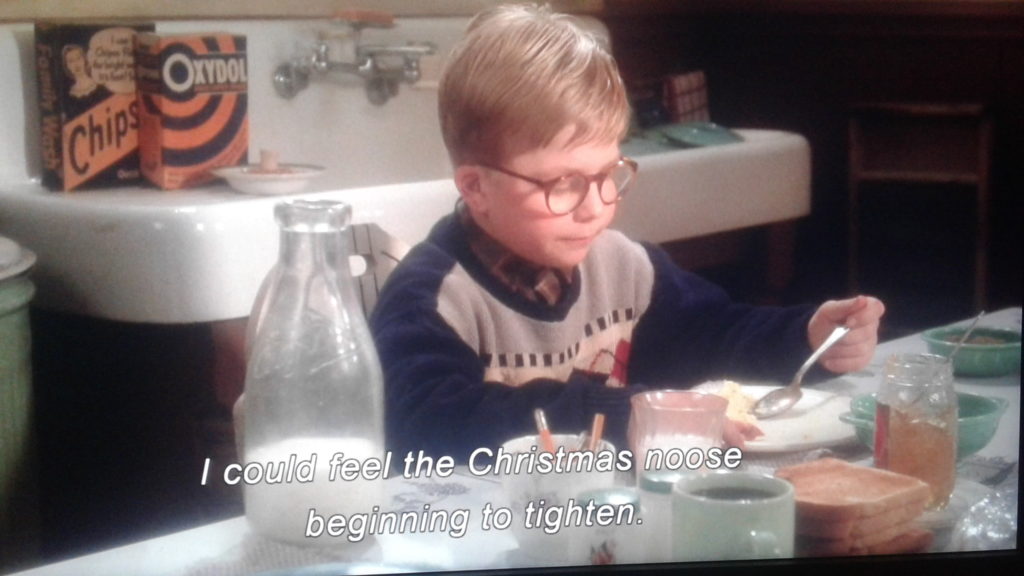
“I could feel the Christmas noose beginning to tighten.”
Ralphie’s glum digestion of sad oatmeal evokes one of the cruel truths of childhood: a kid will never win. A kid can plot, cajole, plead, or scheme, but in the end a kid’s best efforts are wasted by a fundamental lack of control over his or her destiny. Furthermore, the emotional roller coaster that is a child’s life finds little consolation, as this image painfully shows, in the doubtful refuge of self-pity.
Lesson 4 (7:54 – 8:01)
…especially when the opponent is your mother.
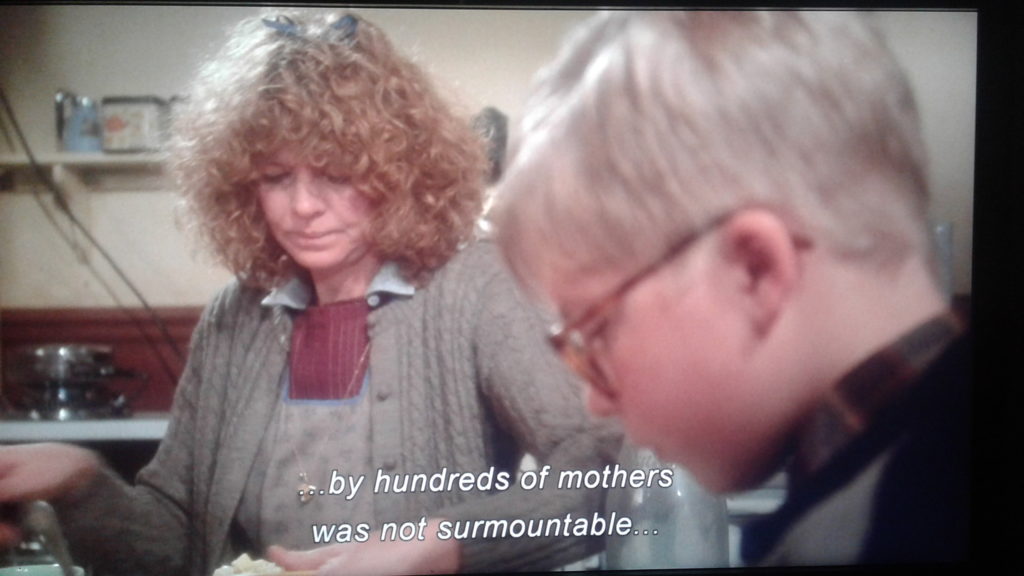
“…by hundreds of mothers was not surmountable…”
Though my own mother passed away almost 25 years ago, her airtight, inarguable logic will continue to haunt my own poor attempts at decision-making until I myself am no more. Like life itself, it simply is not fair that the bonds of motherhood are anchored in an irrefutable, unyielding rectitude. (It does keep me honest, though.)
Lesson 5 (11:56 – 12:13)
Children inevitably become their parents.

*indecipherable swearing emanating from the basement*
And more specifically: the weaker, usually male parent. To this day, speaking of myself, a steady stream of profanity will pour forth unbidden from quivering lips at the mildest provocation: lost keys, wrong directions, stubbed toe, whathaveyou. (A literal curse, moreover, that can apparently be traced along the direct male line of my family for four generations. Which is possibly why the phrase “son of a Kaiser” is in my swearing vocabulary.)
Lesson 6 (27:40 – 27:53)
If a kid won’t eat, it’s really not worth resorting to trickery.
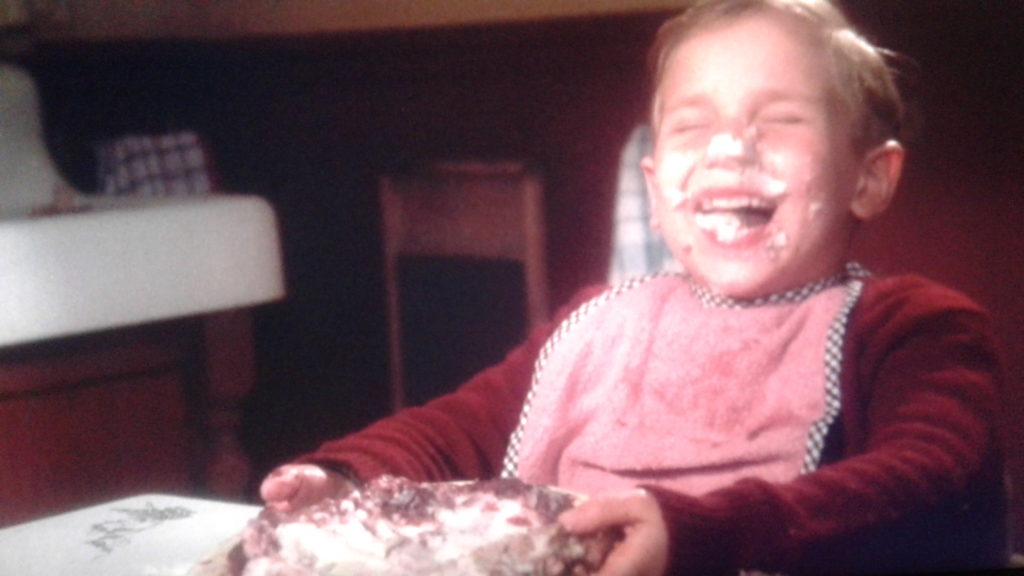
Bringing back vivid memories of my own younger brother, dressed dolefully in his Cub Scouts uniform, refusing to eat a bowl of chili into the late hours of the evening, I’m really glad in retrospect that my parents did not use some cheap ruse to get him to eat. Zach may have missed his Cub Scout meeting that night, but at least he retained his dignity, and the rest of us were mercifully spared the image of him eating like a literal pig.
Lesson 7 (32:01 – 33:20)
Life’s victories are not only small but absurd.

“Oh, look at that. Will you look at that? Isn’t that glorious?”
On air or in the pages of Playboy, Shep’s Old Man’s misplaced enthusiasm over winning the famed Leg Lamp was heralded as “the birth of pop art”, but in A Christmas Story is correctly contextualized as a brilliantly-lit blight on Cleveland Street. Shining brightly forth in its unutterable folly, the “soft gleam of electric sex” invites sober reflection on our own considerable faults and failings.
Lesson 8 (40:40 – 40:52)
Disasters occur well beyond one’s ability to adequately cope with them.

“Oh, *&^%$*##”
An eternal klutz myself, as is my own Old Man, it is tempting in all such situations to shift blame to fate, the elements, inadequate lighting, the clumsiness of others, or whathaveyou. Otherwise, though, and despite the dire consequences for a child of 9, it is often easier to simply swear.
Lesson 9 (42:10)
Punishment rarely fits the crime.
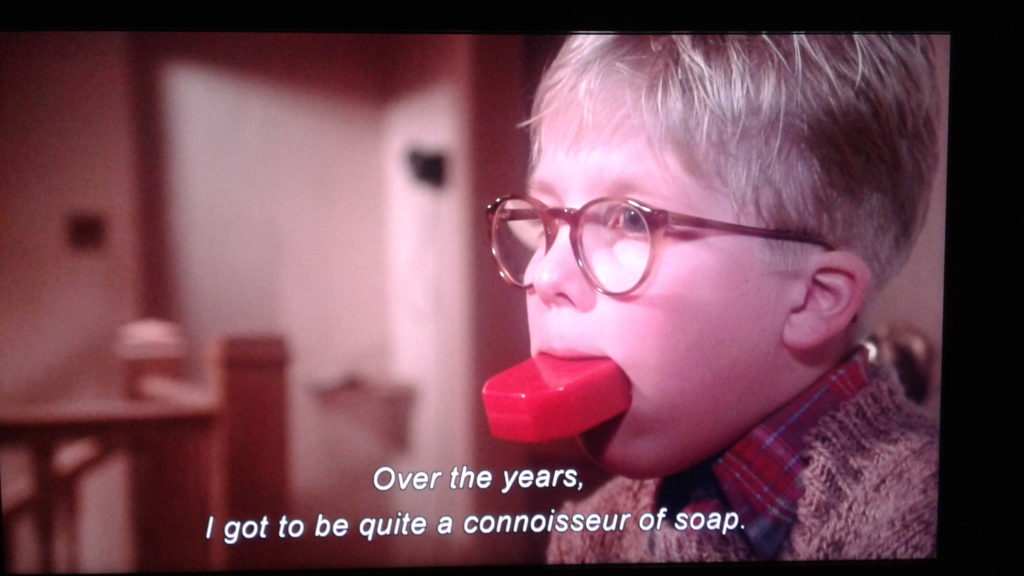
“Over the years, I got to be quite a connoisseur of soap.”
Though I had been familiar with this arcane treatment from a very young age, “washing your dirty mouth out with soap” was frequently threatened but never implemented as a child whose word choice was often more suited to the backroom of bars than a suburban household. If it had, however, cruel and unusual though the extreme measure may seem, it’s possible the aftertaste of Lifebouy might have lingered on the palate well into adulthood, thus cleansing the more potty-like aspects of my vocabulary.
Lesson 10 (42:38 – 42:55)
Throwing a friend under the bus of blame is often a child’s best line of defense.
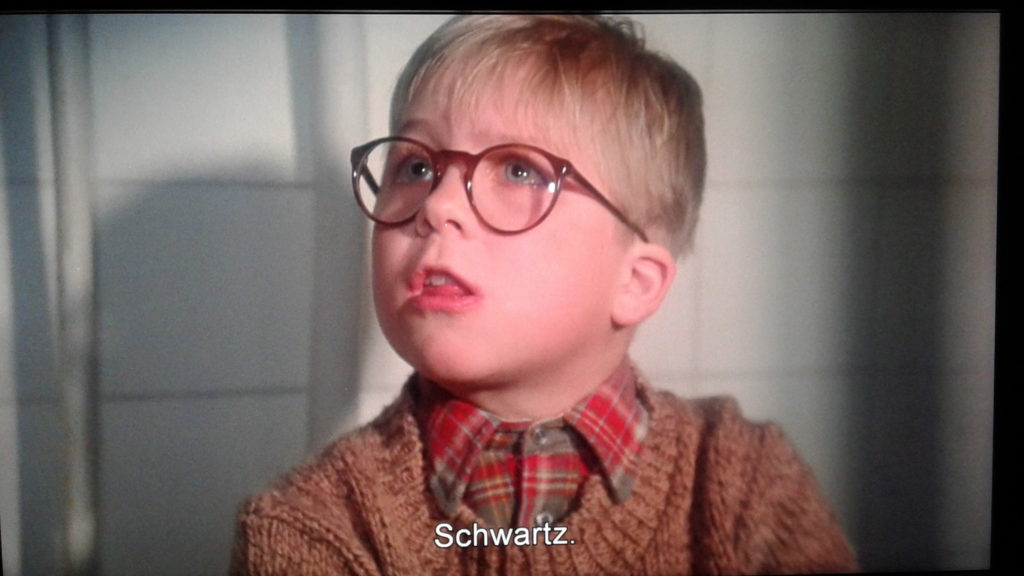
“Schwartz!”
Turning rat fink as a kid is not only encouraged but necessary when the terrible consequences of wrongdoing are held in the balance. Bonds of honor, loyalty, and friendship are easily broken, cast away like so many unwanted Christmas cards, when confronted with the unrelenting Gestapo tactics of one’s parents.
Lesson 11 (45:14 – 46:12)
Though of dubious comfort, self-pity offers valid refuge from the miseries of childhood.
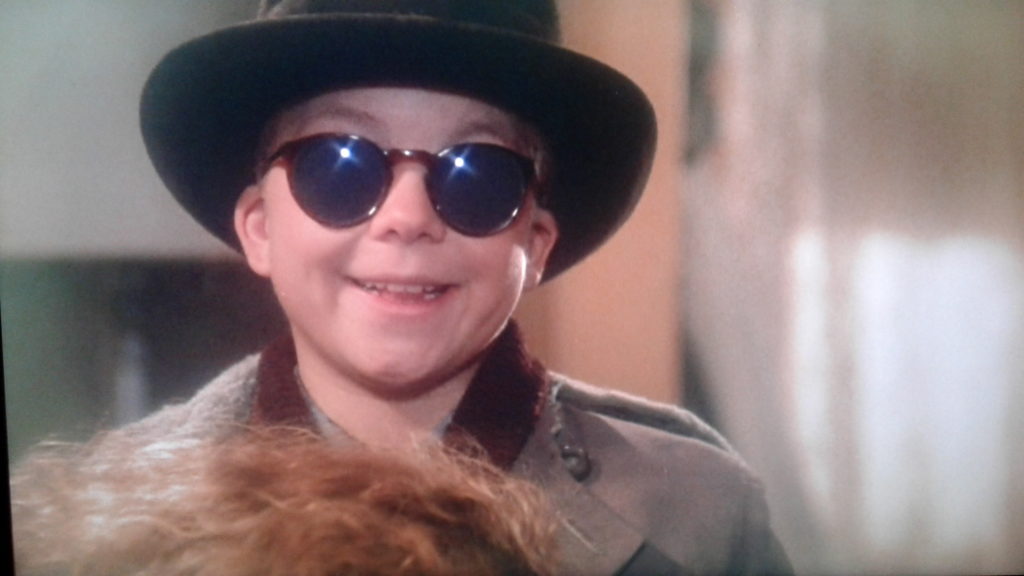
The essential unfairness of being a kid finds directly proportionate though ultimately unsatisfactory consolation in an active fantasy life. Ralphie’s self-sustaining ability to rise above his beleaguered circumstances and imagine a better and brighter day – when he is stricken blind by the after-effects of soap poisoning – should prove a dubious inspiration to us all.
Lesson 12 (48:58 – 50:56)
Childhood is a long and drawn-out process of disillusionment.

“Ovaltine?”
The lesson of the Little Orphan Annie secret decoder pin applies to just about every level of American life: the essential hustle behind an impulse-ridden, consumer-driven society swimming like the Great White Whale in the wine-deep ocean of consumer capitalism. Like the crestfallen image of Ralphie here, the scales rapidly fall from our eyes when cunningly disguised forces attempt to persuade us otherwise regarding, say, the chalky, gritty, unappetizing taste of “rich, chocolatey Ovaltine”.
Lesson 13 (52:08 – 52:23)
In the home, accidents are rarely accidents.
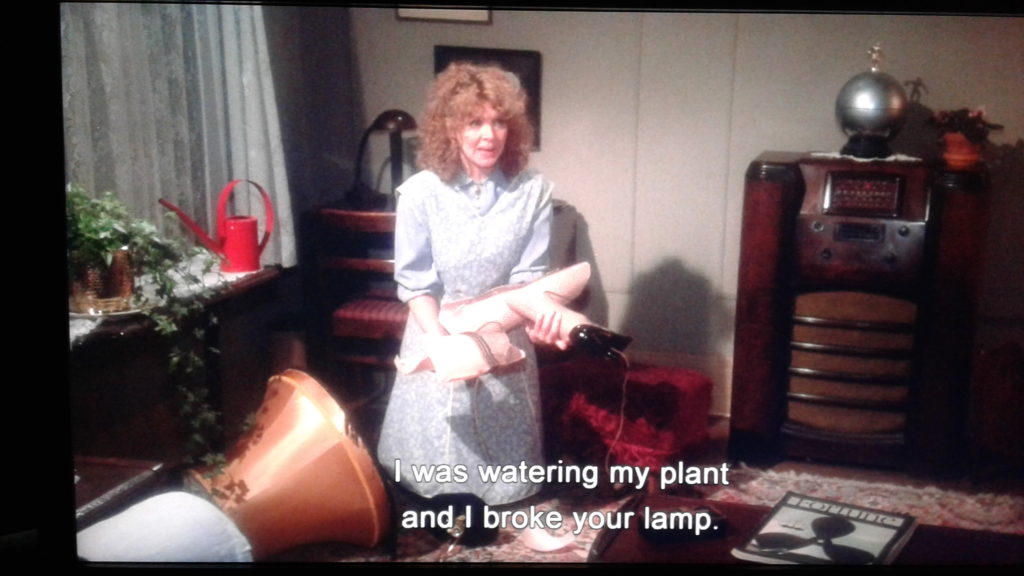
“I was watering my plant and I broke your lamp.”
Though everything may not always happen for a reason, in the context of a suburban home they invariably do. Ralphie’s mother’s Machiavellian measures regarding a hated and ill-fitting home furnishing, while extreme, are unsurprising when the tasteful consistency of the living room is at stake.
Lesson 14 (57:28 – 58:47)
Even the bespectacled have their breaking point.

“A fuse blew and I had gone out of my skull.”
As will become clear by this point in the narrative, the thousand and one indignities visited upon Ralphie’s simple desire for BB gun glory here erupt in a flood of violence and a torrent of obscenities directed at local bully Scut Farkus. In terms of the “Desire, Deception, Discovery” development of the 90-minute movie, as identified by film scholar Howard Suber, the turning point of the narrative at precisely 2/3rds of the way through hinges on otherwise mild-mannered Ralphie unleashing the full force of his repressed fury.
Lesson 15 (1:01:02 – 1:02:59)
The parental dynamic in most households closely resembles Good Cop/Bad Cop.

“Oh, you know how boys are.”
The offstage threat that is the paternal presence is nicely evaded by the motherly influence here, as Ralphie’s mother skillfully deflects the Old Man’s presumed reaction to Ralphie beating up a kid and, worse, breaking his glasses. Like the soothing superego in relation to the raging id, the parental roles balance each other out yet again.
Lesson 16 (1:11:57)
A proper Christmas tree should be larger than the dimensions of your living room.

An excess of Christmas spirit may not be advisable, but if your family already has enough decorations, trimmings, and lights to bend a small sapling, possibly the most ostentatious tree on the lot is permissible. If nothing else, your envious neighbors will take note, and the always entertaining Great Christmas Tree Wars of the following season can properly commence.
Lesson 17 (1:16:11 – 1:16:50)
It is better to receive than give.

This seems a no-brainer. However, it should be noted that gift-giving is an unfortunate though necessary prerequisite to receiving said gifts. (If you can get away with receiving while not giving, though, more power to you.)
Lesson 18 (1:16:53 – 1:19:29)
Except those gifts received from your Aunt Clara.

I think of all the time and effort Aunt Clara must have put into this admittedly elaborate costume – possibly sewing patterns through the warm summer months – just to brighten her beloved nephew Ralphie’s face on Christmas morning. But then I think of this “pink nightmare” from Ralphie’s point of view – a red-blooded American male who will one day serve in the Army signal corps during the Korean War – and say it would have been better if Aunt Clara sent cash. In the case of a bunny costume sent to a 9 year old boy, the thought really doesn’t count.
Lesson 19 (1:20:08 – 1:22:10)
The gruffest member of your family is also the sweetest.
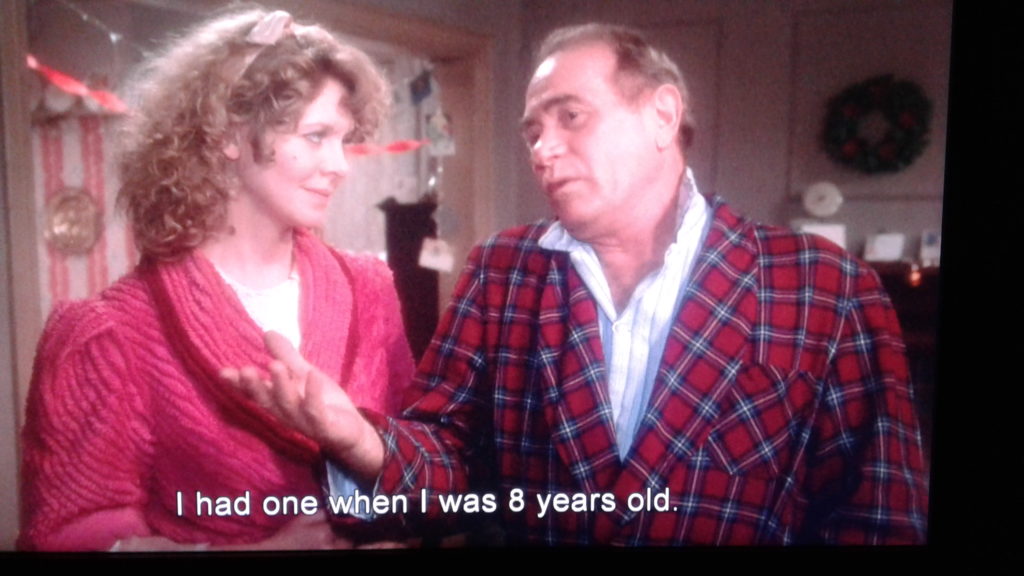
“I had one when I was 8 years old.”
Boy oh boy, does the Old Man really come through for Ralphie! Which just goes to further show the true dynamic behind the traditional family: mothers may have the kids’ best interests at heart, but dads will always be there – in this case rather tenderly – to brew a little necessary roughness into their progeny.
Lesson 20 (1:22:53)
But once again, moms are always right.

“You’ll shoot your eye out/You’ll shoot your eye out”
Proving the adage absolutely correct in both respects, poor Ralphie actually shoots his eye out! Fortunately, naturally protective eyewear prevents the actual loss of an eye. However…
Lesson 21 (1:23:44)
Glasses are made to break.

“Oh, no. Pulverized.”
Disasters, by plural sense of the word alone, rarely occur by themselves, and every bespectacled child’s worst-case scenario endpoint is here fulfilled as Ralphie’s black boot – not unlike that of Santa’s from the earlier, similarly traumatic scene – grinds his own camouflaged glasses into the soft, white snow. Not even an understanding mother would buy some cockamamie story about specious icicles falling like frozen daggers from the roof…
Lesson 22 (1:25:31)
A little fake sympathy never hurts.

“I had pulled it off.”
But fortunately Ralphie’s mother overlooks an obvious lie and, perhaps realizing her child has experienced enough seasonal-related stress, even overlooks the best possible opportunity to remind her son that BB guns are dangerous. It may be here a point of saccharine wish-fulfillment on the part of Hollywood, Jean Shepherd, and director Bob Clark, but the mother’s indulgent treatment of poor Ralphie, along with the Old Man’s equally indulgent gift, brings parents and children to a point of full understanding and indeed harmony at movie’s end.
Lesson 23 (1:26:02 – 1:26:36)
Turkey is for Thanksgiving.

We never had turkey for Christmas in my family growing up, so I always found this scene puzzling, and the trauma of having the dinner eaten up by a pack of wild dogs far removed from my own experiences, until I later realized that different families have different traditions. Some open gifts on Christmas Eve, some wait until Christmas morning; some drink spiked eggnog, others fruit punch; and still others eat turkey on both Thanksgiving and Christmas – redundant though the last might ultimately seem.
Lesson 24 (1:27:22 – 1:29:17)
Christmas is for Chinese?

Well, why not? A Peking duck with its head still attached, some mildly offensive racial stereotyping, and the most irritating Christmas carol in the seasonal canon is more than made up for by the visually delicious notion of a bowling alley in a Chinese restaurant open on Christmas Eve.
Lesson 25 (1:29:52)
The little moments make the otherwise terrifying sweep of the season worthwhile.

“Merry Christmas.”
Making up for all the stress, sacrifice, and general unpleasantness of the season, a snowglobe scene from the Parker’s tree-lit living room is the best Christmas present a parent could hope for. Sharing a solitary moment of togetherness in stark contrast to 90 preceding minutes of conflict and strife, Ralphie’s mom and dad steel themselves for the onslaught of the coming year.
18 Brass Figlagee Lessons For The Whole Year
Far from confining himself to merely seasonal topics or nostalgic revery, Jean Shepherd – known to his legions of radio fans as “Shep” – had much to say beyond the 25 days of December. From education to politics, from childhood to old age, the deceptively “trivial” concerns of talk radio’s most fitfully festering voice distinctly and distinctively resonated all 340 other days of the year. Symbolized by frequent mention of the elusive Brass Figlagee – the ultimate radio contest call-in prize which 25 years of hilariously disappointed listeners discovered never existed – these latter 18 BF Lessons stand in for those frequent times when Shep answered the inaudible yet persistent call of his devoted radioland audience for an “Encore!”

“…and I will award the Brass Figlagee with Oak-Leaf Palm and Golden Braid to the listener who can identify the villain in this 1935 radio episode of Little Orphan Annie…”
Brass Figlagee Lesson 1 (13:02 – 13:17)
Continued survival often necessitates extreme discomfort.
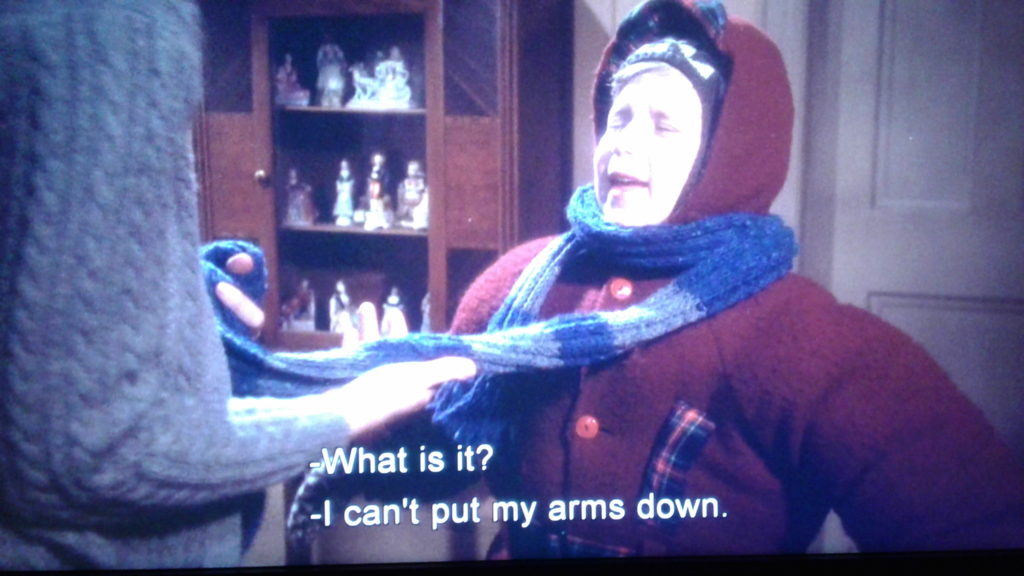
“What is it?” “I can’t put my arms down!”
Midwestern winters can be brutal, and the most hilarious part about this ritualistic preparation for the elements is that little Randy’s extra 30 pounds of winter padding is in fact no exaggeration. A kid may be crushed under the weight of the over-insulation, but at least he or she won’t die of hypothermia on the way to school.
Brass Figlagee Lesson 2 (16:02)
School is where fun goes to die.

“And as you’ll remember, Silas Marner–“
With a visual force equal to a poetic revery by William Wordsworth, a philosophical tract by Jean-Jacques Rousseau, or a fiery essay by John Dewey, the “bottom drawer of the teacher’s desk” exposes in one sweeping image the fundamental failure of education as an institution. Possibly Buck Rogers, slingshots, water pistols, and wax lips may not easily fit into a conventional lesson plan, but, hey, would it hurt to try, Miss Shields?
Brass Figlagee Lesson 3 (16:06 – 16:50)
Conflict resolution reaches heights of sophistication that rapidly devolves after the age of 8 years old.

“I triple-dog dare you!”
Easily asserting its procedural superiority over, say, bipartisan politics, the essentially fair and roundly democratic system of “dares” makes no transparent or unequal distinction between opponents. Nuclear disarmament, healthcare, the tax code, environmental abuse; all would most likely be just as well served by whomever is best able to add the most “dog” to their argument.
Brass Figlagee Lesson 4 (17:33)
But the results are the same.
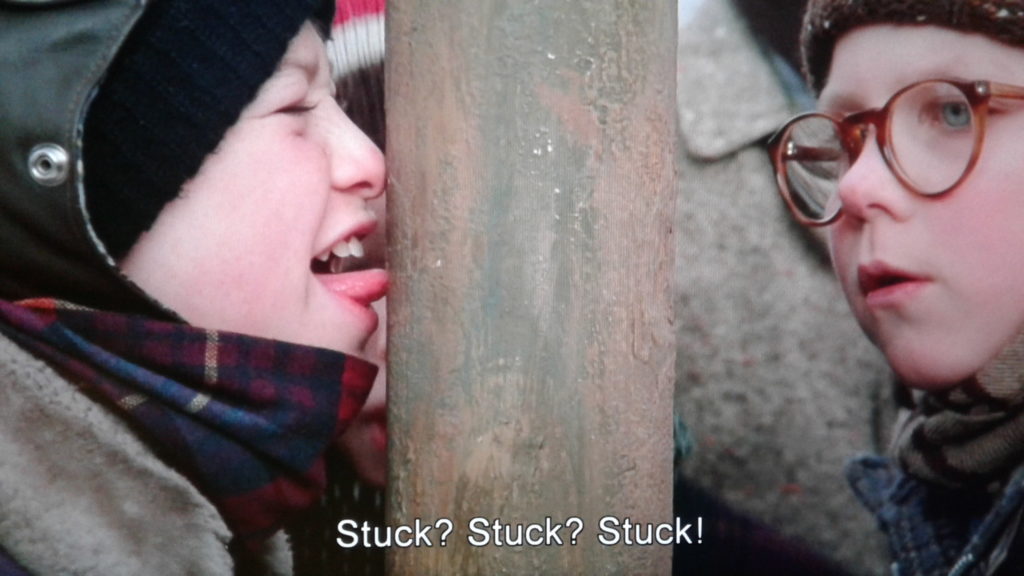
“Stuck? Stuck? Stuck!”
That most arguments figuratively end with someone’s tongue stuck to a frozen pole, however, is a good reminder of the futility of persuasion. (Though the triumph this tongue-tied tableau represents of reality-based science over willful ignorance is vaguely encouraging.)
Brass Figlagee Lesson 5 (18:15 – 18:19)
In the end, your best friends will abandon you.

“Flick? Flick who?”
Even St. Peter denied his Lord – three times before the cock crowed, as I recall – and here Ralphie and Schwartz’s disavowal of erstwhile friend Flick proves the inconstancy of those nearest and dearest under pressure. Boyhood is virtually synonymous with betrayal, but it is at least somewhat consistent, if not reassuring, that Ralphie will similarly turn on Schwartz before film’s end.
Brass Figlagee Lesson 6 (19:06 – 19:42)
There’s nothing more entertaining than escalating tragedy.

As drivers-by car wrecks will amply demonstrate, the opportunity to gawk at others’ misfortune is an endless source of pleasure for most people. (I believe this also explains the continuing appeal of game shows, celebrity interviews, and reality TV.)
Brass Figlagee Lesson 7 (21:00)
The foundation of American history, politics, and business is what you can get away with.


“We knew darn well it was always better not to get caught.”
Ralphie attends Warren G. Harding Primary School, named after the President scholars consistently call the worst in U.S. history. The 29th President died in office before revelations of shady dealings, corrupt cronies, and an extramarital affair fully broke, so perhaps WGH’s legacy was salvaged by mortal evasion of jailtime. (At least as far as Hohman, Indiana was concerned.)
Brass Figlagee Lesson 8 (23:21 – 23:24)
Social Darwinism begins early.

“…or one of the nameless rabble of victims.”
Too small, too fat, too dumb; a kid’s weakness is exposed quickly in life, and childhood’s gazelle-devouring tigers equally and rapidly assert their strength of superiority with each noogie, snake bite, wet willie, and black eye. We may wish to pretend or deny that bullying, toadying, and victimhood is not the natural order of childhood, but the stark realities of kid-dom say otherwise.
Brass Figlagee Lesson 9 (46:57 – 47:10)
Teachers like fruit.
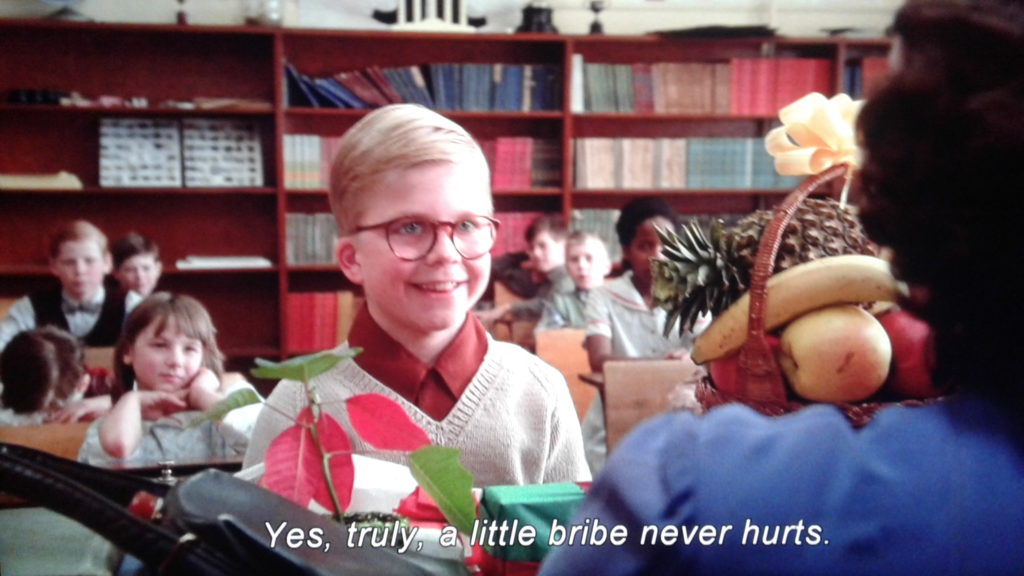
“Yes, truly a little bribe never hurts.”
Where or how the tradition started may be unknown, but it is by now well-established that education and natural sugars go hand-in-hand. Fruitarianism, spellchecker to the contrary, has recently been brought to my attention as an actual dietary movement, and while educators have long known its nutritional benefits, casual dieters should be aware of the potential pitfalls of over-regularity.
Brass Figlagee Lesson 10 (48:31)
Never belong to a club that would have you for a member.
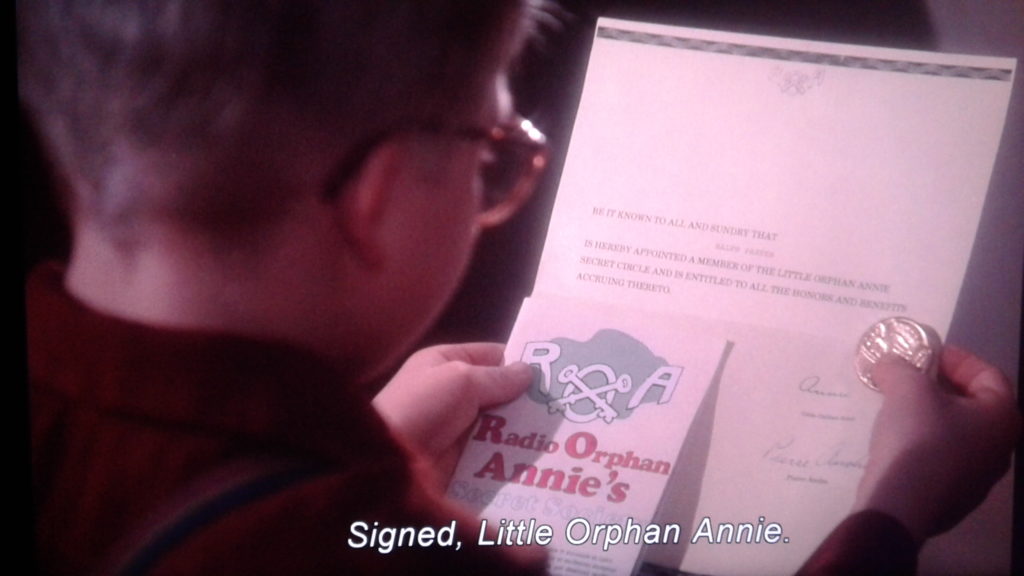
“Signed, Little Orphan Annie.”
The so-called Groucho Rule is especially timely around the holidays, as the temptation to actively join charity organizations, church groups, and all manner of activities is unusually strong. Comfort in numbers, so to speak. Remembering your past social failures, your inability to make small talk, and your general disdain for competition are all good antidotes towards any such time-wasting effort.
Brass Figlagee Lesson 11 (55:06 – 55:14)
Every group has its patsy.

“Uncle! Uncle!”
Some kids know when to run and others are named “Flick”. As identified in the classic bestseller The Family Crucible, all social units have their scapegoat, the unfortunate member upon whom all the group’s worst tendencies are visited, and such is also the case with the friends of childhood. As observed by the poet William Blake, “Some are born to Sweet Delight/Some are born to Endless Night”. Of the latter, the Flicks of life will forever be crying “Uncle!”
Brass Figlagee Lesson 12 (55:30 – 56:18)
Your best efforts in life may go unrewarded.

“You’ll shoot your eye out?”
Scratch that: will always go unrewarded. The “feverish fluidity” with which Ralphie’s peerless prose flowed so effortlessly from his penny pencil is graded a middling “C+”, with the added and by now gratingly familiar warning that “you’ll shoot your eye out!” To hear the latter repeatedly from your mother is one thing; to see it in permanent red ink is quite another.
Brass Figlagee Lesson 13 (1:04:10 – 1:05:48)
Parades are boring.
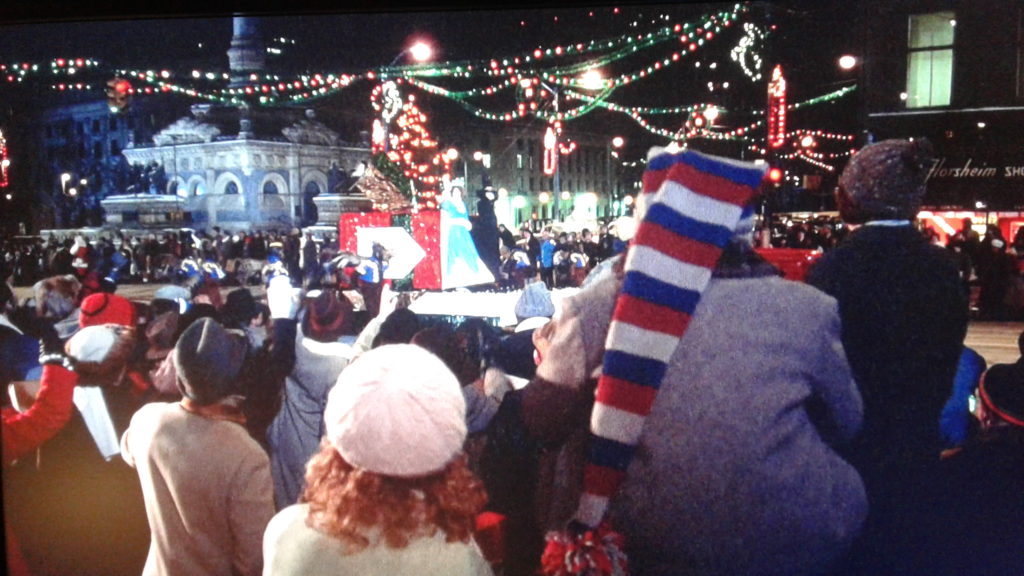
Having played trombone in my high school marching band, I can safely say that the only thing more unpleasant that watching a parade is actually being in one. A waste of time for all involved, it’s better to just stay home.
Brass Figlagee Lesson 14 (1:05:51)
Santa is terrifying.


“And what’s your name, little boy?”
The red lobster king sitting on the tinsel throne of his Christmas mountain certainly looks imposing as Ralphie and Randy heedlessly ascend the escalator to the upper floor of Higbee’s department store. On every street corner, in every department store and mall, the omnipresence of the seasonal, gift-giving god should give every child pause for terror.
Brass Figlagee Lesson 15 (1:07:36)
Adults who dress up in costumes are best avoided.
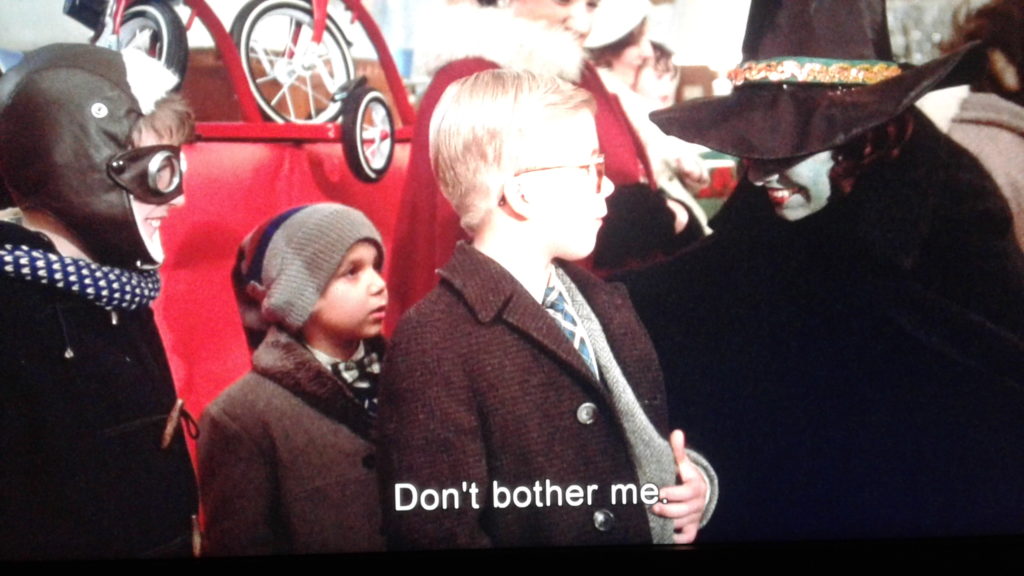
“Don’t bother me.”
Masks, makeup, outfits, and props have their place, one supposes, but the rest of us find more than a little uncomfortable whatever temporary escape they offer people of unsure identity. Feel free to wear whatever you like, but do excuse me if I am unable to adequately indulge your fantasies.
Brass Figlagee Lesson 16 (1:07:49)
Kids who are educated in the home should probably stay there as well.

“I like the Tin Man.”
I sincerely apologize for this one, as it is more than a little mean, and possibly even more unfair, but any odd youth wearing goggles, grinning vacantly, and expressing unabashed admiration for a character from The Wizard of Oz obviously has never been properly socialized by the cruelties of public school. Kids need kids, and separatism aside, all parents should do their child the favor of introducing him or her to the interpersonal indignities of life early on.
Brass Figlagee Lesson 17 (1:08:24 – 1:10:51)
Your heroes will inevitably disappoint you.

“ho! ho! ho!”
As the past few months in entertainment, politics, and the media have taught us, it’s simply not worth admiring and/or looking up to anyone anymore. So embrace the imperfection that is human nature and trust to hope that we can all someday, somehow do better as a species. (Or, more likely, not.)
Brass Figlagee Lesson 18 (1:06:43)
There’s always a smartass around to point out the obvious.
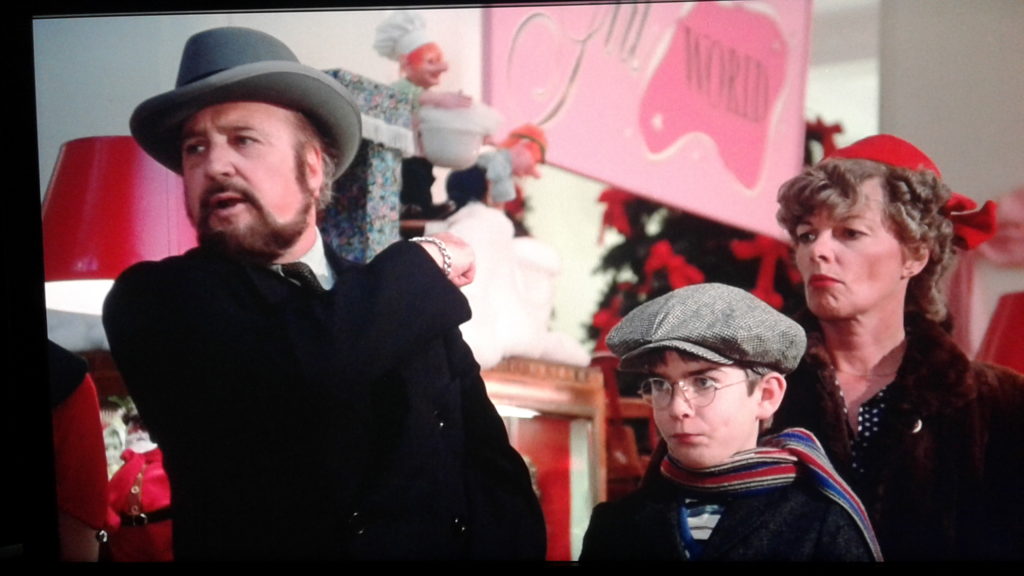
“The line ends here. It begins there.”
“The line ends here. It begins there.” Everywhere you go you’ll invariably encounter some bearded bastard who will try to tell you what to do. In this case, sharp-eared auditors will note this hirsute, well-dressed family man is none other than the film’s narrator, Jean Shepherd, making a cameo appearance and directing his young self to the end of the Santa-waiting line.
Brass Figlagee Lesson 19 (1:30:10 – 1:30:44)
Visions of sugarplums are in actuality a hail of bullets.

Next to me in the blackness lay my oiled blue steel beauty.”
Like the perennial iron fist in the velvet glove, our “all is right with the world” happy ending is tempered by thoughts of all the small animals, birds, and larger insects that will soon fall victim to Ralphie’s Official Red Ryder Carbine-Action Two-Hundred-Shot Range Model Air Rifle. As a testament to Shep’s enduring comic voice, an abundance of seasonal cheer is laced with a thimbleful of seasonable cyanide. Bittersweet, indeed, but in the very best sense of the season.
